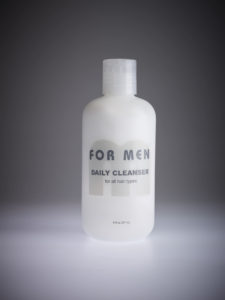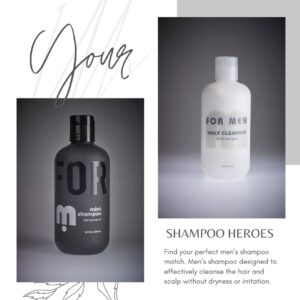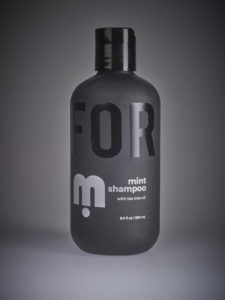In the realm of beauty products, sulfates have garnered significant attention. Both positive and negative attention. Sulfates are chemical compounds commonly found in many personal care items, ranging from shampoo to facial cleansers. Despite their widespread use, sulfates have sparked debates regarding their potential adverse effects on hair and skin health. Today’s blog post will delve into the misunderstood world of sulfates in men’s grooming products. Including the exploration of their classification, effects on hair and skin, and distinguishing between “good” and “bad” sulfates.
Understanding Sulfates: Classification and Function
Sulfates, chemically referred to as sodium lauryl sulfate (SLS) and sodium laureth sulfate (SLES), are surfactants widely utilized in beauty and personal care products. Surfactants are compounds that lower the surface tension between two substances. This aids in the emulsification and dispersion of oils and dirt, facilitating their removal. In beauty products, sulfates serve as effective cleansing agents. Imparting that satisfying lather and ensuring thorough removal of impurities from the skin and hair.
Men’s Grooming Products Containing Sulfates | Ex. Shampoo
Sulfates are in men’s grooming and personal care products. For example, shampoo and shaving creams. Primarily, sulfates are in products that produce that foam or lather. Here are some types of products that often contain sulfates:
- Shampoo
- Conditioners
- Body washes
- Facial cleansers
- Hand soaps
- Bath soaps
- Shower gels
- Toothpaste
- Shaving creams
- Makeup removers (especially those in liquid or foaming forms)
- Some moisturizers and creams (although less common)
It’s important to note that not all products in these categories contain sulfates. Many brands now offer sulfate-free alternatives due to increasing consumer awareness about potential skin and hair sensitivities associated with sulfates.
List of Known Sulfates: Good and Bad
Ranking men’s grooming products based on sulfates can be subjective, as men may have different sensitivities or preferences. However, I can provide a general guideline based on commonly accepted information regarding sulfates in beauty products. This list of sulfates is based on less potentially irritating to more potentially irritating:
- Sodium Lauryl Sulfoacetate (SLSA): Often considered a gentler alternative to sodium lauryl sulfate (SLS) and sodium laureth sulfate (SLES). It is derived from coconut and palm oils and is known for producing a rich lather without causing significant irritation.
- Sodium Lauroyl Sarcosinate: This is another mild surfactant often used in beauty products. It’s derived from sarcosine, a natural amino acid found in muscles.
- Sodium Cocoyl Isethionate (SCI): SCI is derived from coconut oil and is known for its mildness and ability to produce a creamy lather. It’s often found in cleansing and foaming products.
- Ammonium Lauryl Sulfate (ALS): This is milder than SLS and SLES but can still irritate some individuals, especially those with sensitive skin.
- Sodium Lauryl Sulfate (SLS): SLS is a common surfactant in many beauty and personal care products. It’s effective at cleansing but can be harsh and potentially irritating, particularly for sensitive skin.
- Sodium Laureth Sulfate (SLES): SLES is similar to SLS but undergoes an additional process called ethoxylation. It makes it slightly less harsh but irritates some individuals, especially if used in high concentrations.
- Ammonium Laureth Sulfate (ALES): Similar to ALES, this is milder than SLES but can still irritate, especially for sensitive skin types.
It’s important to note that individual reactions to sulfates can vary widely. What works well for one person may not work for another. Additionally, the concentration of sulfates in a product can also affect its potential for irritation. If you have concerns about sulfates or experience skin irritation, it’s best to consult with a dermatologist or allergist for personalized advice. Additionally, choosing sulfate-free products or products with milder surfactants may be preferable for some men based on their hair and scalp needs.
Why Bad Sulfates Are Detrimental to Hair and Skin
“Bad” sulfates, such as SLS and SLES, are linked to having various adverse effects on hair and skin health. These include:
Stripping Natural Oils: Harsh sulfates are known for their potent cleansing properties. They can strip the scalp and skin of natural oils. This can lead to dryness, irritation, and exacerbation of existing skin conditions such as eczema and psoriasis.
Scalp and Skin Irritation: SLS and SLES are known to cause scalp and skin irritation, including itching, redness, and inflammation. Individuals with sensitive skin are particularly susceptible to these adverse reactions.
Hair Damage: Prolonged use of sulfates can result in hair damage, including dryness, brittleness, and breakage. This is due to the stripping of natural oils and moisture from the hair shaft, leaving it vulnerable to environmental damage and styling stress.
Disruption of the Skin Barrier: Sulfates can compromise the skin barrier, which is crucial in maintaining hydration and protecting against external aggressors. Disruption of the skin barrier can lead to increased moisture loss, sensitivity, and infection susceptibility.
Benefits of Good Sulfates for Hair and Skin
Contrary to their notorious counterparts, certain sulfates benefit hair and skin health. Good sulfates, such as sodium myreth sulfate (SMS) and sodium lauryl sulfoacetate (SLSA), provide effective cleansing without causing significant harm. The benefits of good sulfates include:
Gentle Cleansing: Good sulfates offer effective cleansing while being gentler on the skin and hair. They help remove impurities without excessively stripping natural oils, making them suitable for individuals with sensitive skin or dry hair.
Moisture Retention: Unlike bad sulfates, good sulfates help retain moisture in the skin and hair, preventing dryness and dehydration. This is essential for maintaining skin hydration and promoting hair health and elasticity.
Compatibility with Sensitive Skin: Good sulfates are less likely to cause irritation or allergic reactions, making them suitable for individuals with sensitive skin or conditions such as eczema or rosacea.
Compatibility with Color-Treated Hair: Sulfates can accelerate color fading in dyed or chemically treated hair. Good sulfates, however, are less likely to strip away hair color, allowing for prolonged vibrancy and longevity of color-treated hair.
Shampoo For Men: Sulfate v. Sulfate Free
Sulfates play a significant role in the formulation of beauty products, serving as effective cleansing agents. However, sulfates are not equal. Distinguishing between “good” and “bad” one is crucial for maintaining optimal hair and skin health. While “bad” sulfates such as SLS and SLES can lead to dryness, irritation, and hair damage, “good” sulfates like SMS and SLSA offer gentle cleansing and moisture retention benefits. Ultimately, understanding the effects of sulfates on hair and skin can empower consumers to make informed choices and select products that align with their individual needs and preferences.
References:
- Araviiskaia, Elena, et al. “The Role of Sulfates in Hair Care Products.” International Journal of Trichology, vol. 7, no. 3, 2015, pp. 95–99.
- Farage, Miranda A., et al. “Sodium Lauryl Sulfate (SLS)-Induced Irritant Contact Dermatitis: A Correlation Study between Subjects with Atopic Dermatitis and Nonatopic Healthy Subjects.” Skin Pharmacology and Physiology, vol. 25, no. 3, 2012, pp. 140–145.
- Gavazzoni Dias, Maria Fernanda Reis. “Hair Cosmetics: An Overview.” International Journal of Trichology, vol. 7, no. 1, 2015, pp. 2–15.
- Prakash, Sangeeta. “Sulfate-Free Shampoos: A Review of the Role of Surfactants in Hair Care Products.” Journal of Cosmetics, Dermatological Sciences, and Applications, vol. 3, no. 1A, 2013, pp. 52–55.
Please note we intend today’s blog post to provide a comprehensive overview of sulfates in men’s grooming products. We included a list of known sulfates categorized from “good to bad” but more so listed from mild to harsh.
Looking for a quality men’s shampoo that will not irritate the scalp while cleansing the hair effectively? Check out m by FOR MEN shampoos today!



Stephen